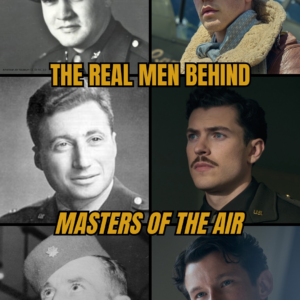Masters of the Air (2024) is the highly-anticipated miniseries from the minds behind Band of Brothers (2001) and The Pacific (2010). Following the exploits of the Eighth Air Force, the nine-episode show, slated to air exclusively on Apple TV+, is sure to bring audiences an up-close view of the intense fighting that took place in the European Theater during the Second World War. The following are just some of the real-life airmen the actors in Masters of the Air skillfully portray.
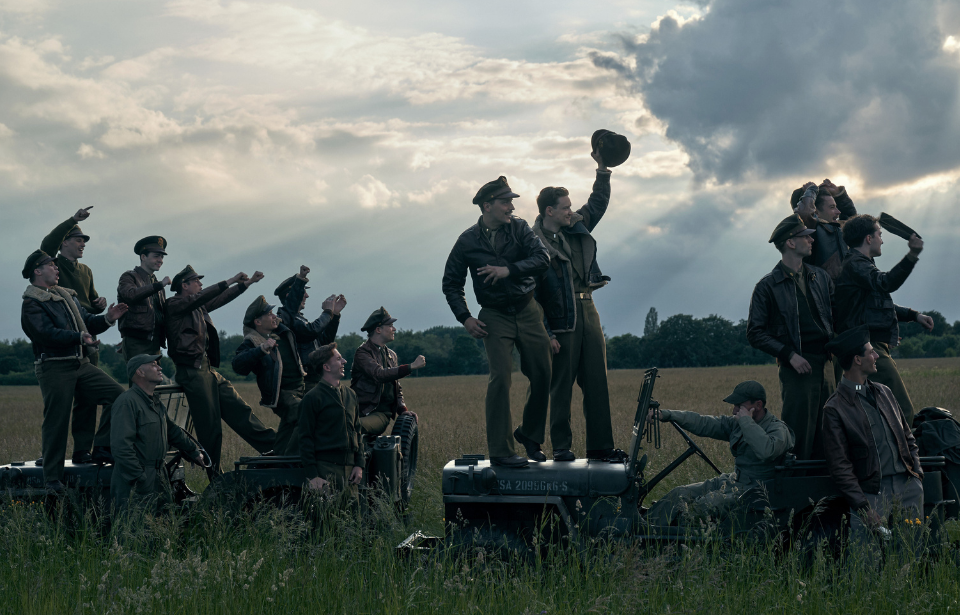
Gale Cleven
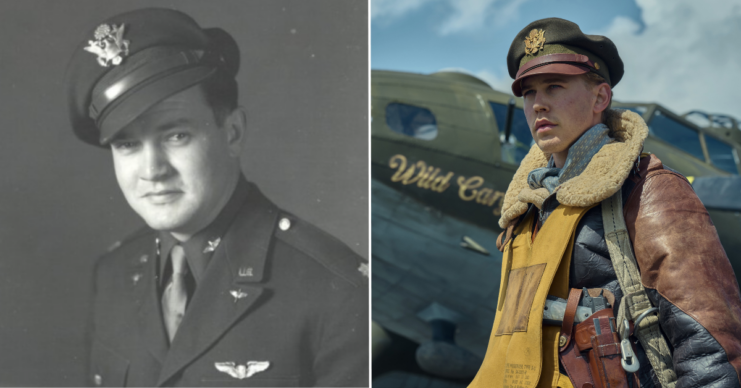
Gale Cleven + Austin Butler in Masters of the Air, 2024. (Photo Credit: 1. American Air Museum CC BY-NC 3.0 2. yassi / MovieStillsDB)
Of the airmen featured in Masters of the Air, Gale Cleven is central to the story. Portrayed by Austin Butler, he joined the military as an air cadet in March 1940 and, shortly after, earned his famous “Buck” nickname. Following training, he was sent to MacDill Air Force Base, Florida, and assigned to the 29th Bombardment Group as an instructor and first lieutenant.
Cleven’s time at MacDill AFB was short-lived, as he was transferred to Idaho to command the 350th Bombardment Squadron, after which he and the 350th were sent to Kearney Air Force Base, Nebraska, where the 100th Bombardment Group was in the middle of preparing for their deployment overseas.
Cleven’s premiere mission in the European Theater took place over Bremen in June 1943, while his most famous was the air raid on Regensburg that August, which saw him in the lead bomber. Despite the aircraft suffering severe damage, the major was able to take control of the aircraft and safely land it in North Africa, albeit after what must have been a terrifying flight. For his efforts, he was awarded the Distinguished Service Cross.
The 100th continued to fly dangerous missions over Europe with the Boeing B-17 Flying Fortress, suffering substantial losses in the process. One saw the downing of Cleven’s bomber, which resulted in him being taken as a prisoner of war (POW) by the Germans. He was housed at Stalag Luft III until the order came to evacuate the camp in late January 1945, at which point the airman managed to lose his overseers and make it back to friendly lines.
Following the Second World War, Cleven continued with the US Air Force, seeing service in Korea and Vietnam. He retired in 1955, having achieved the rank of colonel.
John C. Egan
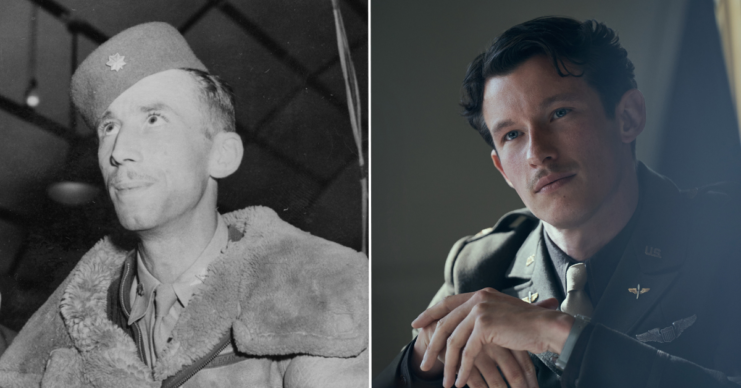
John C. Egan + Callum Turner in Masters of the Air, 2024. (Photo Credit: 1. Roger Freeman Collection / Imperial War Museums / American Air Museum CC BY-NC 3.0 2. yassi / MovieStillsDB)
One of the commanders of the “Bloody 100th,” John C. Egan is among the most famous airmen to be portrayed in Masters of the Air. In 1940, he joined up as a Flying Cadet at Randolph Field, Texas. Two years later, he was assigned to the 29th Bombardment Group as a first lieutenant and instructor, and just a few months after that was transferred to Gowan Army Air Field, Idaho as an operations officer with the 100th Bombardment Group.
After flying a handful of missions with the 305th Bombardment Group at Chelveston, England, Egan took over command of the 418th Bombardment Squadron. Similarly to his comrade and friend, Gale Cleven, he participated in the deadly Regensburg air raid, about which he said:
“We were under fighter attack for three and a half hours and saw three Fortresses immediately around us shot down between the German border and the target. No one turned back, although some of us thought we were as good as dead.”
Egan’s bomber was among those downed during the Münster air raid on October 10, 1943, after which he was captured and sent to Stalag Luft III. Following the Second World War, he returned to the United States to continue his service with the US Air Force, which involved deployments to Korea and the Far East.
Egan unexpectedly died of a heart attack in 1961. He was buried at Arlington National Cemetery with full military honors.
Harry Crosby
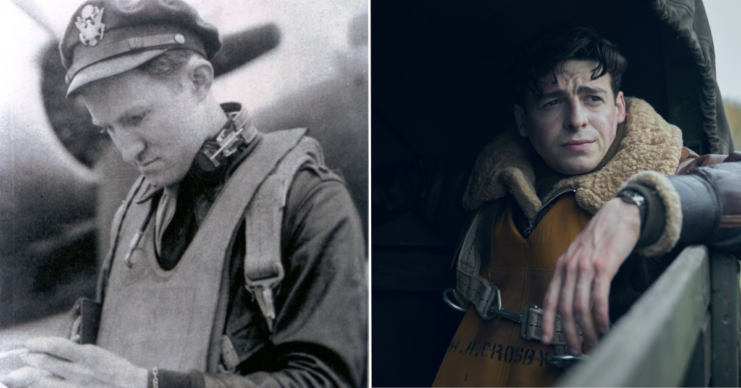
Harry Crosby + Anthony Boyle in Masters of the Air, 2024. (Photo Credit: 1. 100th Bomb Group Museum / American Air Museum CC BY-NC 3.0 2. yassi / MovieStillsDB)
Harry Crosby, portrayed by Anthony Boyle in Masters of the Air, was among the US Army Air Forces’ (USAAF) most skilled airmen, serving as the lead navigator for the 100th Bombardment Group during the Second World War.
Crosby enlisted in the US Army Air Corps (USAAC) the week after the Japanese attack on Pearl Harbor and earned a commission as a navigator at Mather Field, California. As with the others mentioned in this article, he was assigned to the 100th and deployed to England for service aboard B-17 Flying Fortresses over Europe.
On July 24, 1943, Crosby participated in Operation Gomorrah, the bombing of Hamburg by the USAAF and the Royal Air Force (RAF). The week-long air raid destroyed 60 percent of the city and saw Crosby receive the Distinguished Flying Cross for his “outstanding performance as lead Navigator.” This was followed that October with an equally dangerous mission over Bremen, which ended in his B-17 crash-landing after sustaining damage.
For his efforts during the war, Crosby was the recipient of several honors, including the Bronze Star and the Croix de Guerre.
Robert Rosenthal
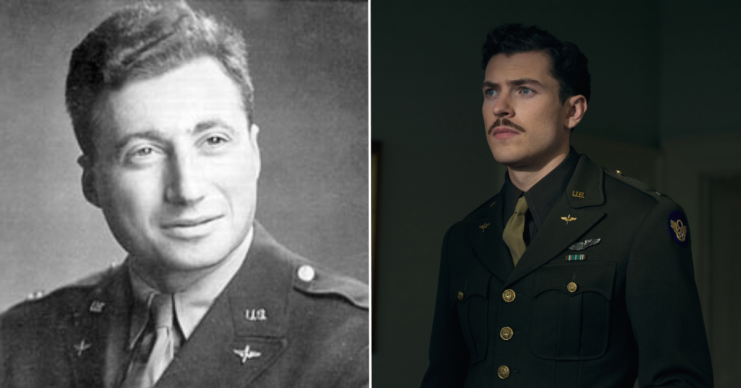
Robert Rosenthal + Nate Mann in Masters of the Air, 2024. (Photo Credit: United States Air Force / Find a Grave / Wikimedia Commons / Public Domain 2. yassi / MovieStillsDB)
Among the most decorated airmen of the Eighth Air Force, Robert Rosenthal is portrayed by Nate Mann in Masters of the Air. The lawyer enlisted in the US Army the day after the attack on Pearl Harbor and, just under two years later, was assigned to the 418th Bombardment Squadron, based out of Thorpe Abbots, England.
“I couldn’t wait to get over there,” he recounted to Donald L. Miller. “When I finally arrived, I thought I was at the center of the world, the place where the democracies were gathering to defeat the [Germans]. I was right where I wanted to be.”
Flying a total of 52 missions aboard B-17 Flying Fortresses, Rosenthal participated in the deadly Münster air raid in October 1943. His bomber was the only one to return, but with a hole in the right wing, two dead engines, three injured crewmen and damaged systems. Over a year later, he was shot down over German-occupied France and was rescued by the Free French, after which he returned to duty, conducting additional bombing missions over Europe.
Following the Second World War, Rosenthal, with his law background, served as one of the assistants to Chief US Prosecutor Robert H. Jackson at the Nuremberg Trials.
For his service, he received 16 decorations, including the Distinguished Service Cross, two Silver Stars and three Distinguished Flying Crosses – two from the United States and one from Britain.
Curtis Biddick
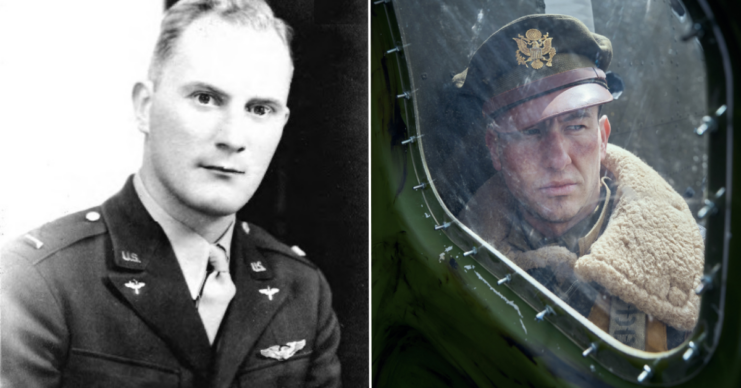
Curtis Biddick + Barry Keoghan in Masters of the Air, 2024. (Photo Credit: 1. American Air Museum CC BY-NC 3.0 2. yassi / MovieStillsDB)
Curtis “Muggs” Biddick is one of the storied airmen whose heroics over Europe are portrayed in Masters of the Air. He enlisted in the US Army Air Corps in January 1942 as an Aviation Cadet, after which he was assigned to the 100th Bombardment Group. He was sent to England in the spring of 1943 and was soon involved in combat action.
On July 24, 1943, Biddick was among those to conduct a 12-hour mission to Trondjheim, the Eighth Air Force’s first attack on a Norwegian target. On the way back to Thorpe Abbotts, his aircraft crash-landed in Aberdeen – luckily, he survived the incident.
Just under a month later, Biddick was back in the sky, this time over Regensburg. Sadly, this air raid proved to be his last, as his bomber suffered an oxygen fire after being struck by enemy fire. The blaze trapped some of the B-17 Flying Fortress’ crew on the flight deck, killing four, including the first lieutenant.
He was interred at the US Cemetery at Jefferson Barracks in St. Louis, Missouri.
Alexander Jefferson
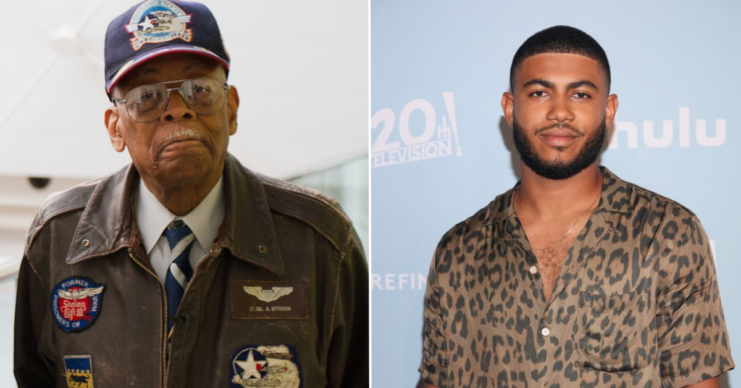
Alexander Jefferson + Branden Cook attending the Hulu Original Tell Me Lies screening and red carpet event at NeueHouse Hollywood, 2022. (Photo Credit: 1. US Embassy London / Wikimedia Commons / Public Domain 2. Robin L Marshall / Getty Images)
While the majority of the airmen featured in Masters of the Air served with the 100th Bombardment Group, not all of them did. Alexander Jefferson, portrayed by Branden Cook, was one of the famous Tuskegee Airmen who flew with the 332nd “Red Tail” Fighter Group.
Jefferson volunteered for flight training upon joining the US Army Reserve, but was denied and, instead, tasked with being a chemical analyst. He applied to the US Army Air Forces and, in April 1943, was told to report to Tuskegee Army Air Field, Alabama. After earning his wings, he was assigned to Ramitelli Airfield, Italy, from which he flew the North American P-51 Mustang against enemy targets. He also served as an escort with the Fifteenth Air Force.
After being shot down over southern France in August 1944, Jefferson, like many Allied pilots, was taken as a prisoner of war and sent to Stalag Luft III, before being moved to Stalag VII-A. As the Soviet Red Army moved into Poland, he and other POWs were forced to march to Munich, at which point they were rescued by Gen. George Patton‘s Third US Army.
After returning to the United States, Jefferson served as an instrument instructor at Tuskegee Army Air Field and remained in the US Air Force Reserve, before retiring in 1969. In 2004, he was awarded the Purple Heart for the wounds he’d suffered after being shot down in German-occupied France during World War II.
Robert H. Daniels

Ncuti Gatwa attending the Virgin Media British Academy Television Awards at the Royal Festival Hall, 2022. (Photo Credit: Samir Hussein / WireImage / Getty Images)
Tuskegee Airmen feature heavily in Masters of the Air, with Robert H. Daniels also being portrayed in the miniseries. Taking on the P-51 Mustang pilot is the latest actor to portray the Doctor in Doctor Who (2005-present), Ncuti Gatwa, who made his debut in the role in the December 9, 2023, anniversary special, The Giggle.
Serving with the 301st Fighter Squadron, Daniels was shot down in August 1944 while attacking a German radar unit near the French city of Marseilles. He was subsequently taken as a prisoner of war and held for nine months, until the fighting in Europe came to an end in May 1945.
